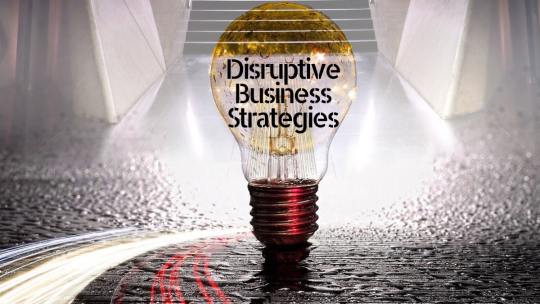#disruptive-innovation
Quote
Creativity is the new currency, so, are you credited with new thoughts or overdrawn in old thinking?
Onyi Anyado
#quotes#Onyi Anyado#thepersonalwords#literature#life quotes#prose#lit#spilled ink#creativity#creativity-quotes#disruptive-innovation#entrepreneur#entrepreneur-quotes#entrepreneurship#innovation#leadership#mind#mindset#thought-leader
31 notes
·
View notes
Text
Big Tech disrupted disruption

If you'd like an essay-formatted version of this post to read or share, here's a link to it on pluralistic.net, my surveillance-free, ad-free, tracker-free blog:
https://pluralistic.net/2024/02/08/permanent-overlords/#republicans-want-to-defund-the-police

Before "disruption" turned into a punchline, it was a genuinely exciting idea. Using technology, we could connect people to one another and allow them to collaborate, share, and cooperate to make great things happen.
It's easy (and valid) to dismiss the "disruption" of Uber, which "disrupted" taxis and transit by losing $31b worth of Saudi royal money in a bid to collapse the world's rival transportation system, while quietly promising its investors that it would someday have pricing power as a monopoly, and would attain profit through price-gouging and wage-theft.
Uber's disruption story was wreathed in bullshit: lies about the "independence" of its drivers, about the imminence of self-driving taxis, about the impact that replacing buses and subways with millions of circling, empty cars would have on traffic congestion. There were and are plenty of problems with traditional taxis and transit, but Uber magnified these problems, under cover of "disrupting" them away.
But there are other feats of high-tech disruption that were and are genuinely transformative – Wikipedia, GNU/Linux, RSS, and more. These disruptive technologies altered the balance of power between powerful institutions and the businesses, communities and individuals they dominated, in ways that have proven both beneficial and durable.
When we speak of commercial disruption today, we usually mean a tech company disrupting a non-tech company. Tinder disrupts singles bars. Netflix disrupts Blockbuster. Airbnb disrupts Marriott.
But the history of "disruption" features far more examples of tech companies disrupting other tech companies: DEC disrupts IBM. Netscape disrupts Microsoft. Google disrupts Yahoo. Nokia disrupts Kodak, sure – but then Apple disrupts Nokia. It's only natural that the businesses most vulnerable to digital disruption are other digital businesses.
And yet…disruption is nowhere to be seen when it comes to the tech sector itself. Five giant companies have been running the show for more than a decade. A couple of these companies (Apple, Microsoft) are Gen-Xers, having been born in the 70s, then there's a couple of Millennials (Amazon, Google), and that one Gen-Z kid (Facebook). Big Tech shows no sign of being disrupted, despite the continuous enshittification of their core products and services. How can this be? Has Big Tech disrupted disruption itself?
That's the contention of "Coopting Disruption," a new paper from two law profs: Mark Lemley (Stanford) and Matthew Wansley (Yeshiva U):
https://papers.ssrn.com/sol3/papers.cfm?abstract_id=4713845
The paper opens with a review of the literature on disruption. Big companies have some major advantages: they've got people and infrastructure they can leverage to bring new products to market more cheaply than startups. They've got existing relationships with suppliers, distributors and customers. People trust them.
Diversified, monopolistic companies are also able to capture "involuntary spillovers": when Google spends money on AI for image recognition, it can improve Google Photos, YouTube, Android, Search, Maps and many other products. A startup with just one product can't capitalize on these spillovers in the same way, so it doesn't have the same incentives to spend big on R&D.
Finally, big companies have access to cheap money. They get better credit terms from lenders, they can float bonds, they can tap the public markets, or just spend their own profits on R&D. They can also afford to take a long view, because they're not tied to VCs whose funds turn over every 5-10 years. Big companies get cheap money, play a long game, pay less to innovate and get more out of innovation.
But those advantages are swamped by the disadvantages of incumbency, all the various curses of bigness. Take Arrow's "replacement effect": new companies that compete with incumbents drive down the incumbents' prices and tempt their customers away. But an incumbent that buys a disruptive new company can just shut it down, and whittle down its ideas to "sustaining innovation" (small improvements to existing products), killing "disruptive innovation" (major changes that make the existing products obsolete).
Arrow's Replacement Effect also comes into play before a new product even exists. An incumbent that allows a rival to do R&D that would eventually disrupt its product is at risk; but if the incumbent buys this pre-product, R&D-heavy startup, it can turn the research to sustaining innovation and defund any disruptive innovation.
Arrow asks us to look at the innovation question from the point of view of the company as a whole. Clayton Christensen's "Innovator's Dilemma" looks at the motivations of individual decision-makers in large, successful companies. These individuals don't want to disrupt their own business, because that will render some part of their own company obsolete (perhaps their own division!). They also don't want to radically change their customers' businesses, because those customers would also face negative effects from disruption.
A startup, by contrast, has no existing successful divisions and no giant customers to safeguard. They have nothing to lose and everything to gain from disruption. Where a large company has no way for individual employees to initiate major changes in corporate strategy, a startup has fewer hops between employees and management. What's more, a startup that rewards an employee's good idea with a stock-grant ties that employee's future finances to the outcome of that idea – while a giant corporation's stock bonuses are only incidentally tied to the ideas of any individual worker.
Big companies are where good ideas go to die. If a big company passes on its employees' cool, disruptive ideas, that's the end of the story for that idea. But even if 100 VCs pass on a startup's cool idea and only one VC funds it, the startup still gets to pursue that idea. In startup land, a good idea gets lots of chances – in a big company, it only gets one.
Given how innately disruptable tech companies are, given how hard it is for big companies to innovate, and given how little innovation we've gotten from Big Tech, how is it that the tech giants haven't been disrupted?
The authors propose a four-step program for the would-be Tech Baron hoping to defend their turf from disruption.
First, gather information about startups that might develop disruptive technologies and steer them away from competing with you, by investing in them or partnering with them.
Second, cut off any would-be competitor's supply of resources they need to develop a disruptive product that challenges your own.
Third, convince the government to pass regulations that big, established companies can comply with but that are business-killing challenges for small competitors.
Finally, buy up any company that resists your steering, succeeds despite your resource war, and escapes the compliance moats of regulation that favors incumbents.
Then: kill those companies.
The authors proceed to show that all four tactics are in play today. Big Tech companies operate their own VC funds, which means they get a look at every promising company in the field, even if they don't want to invest in them. Big Tech companies are also awash in money and their "rival" VCs know it, and so financial VCs and Big Tech collude to fund potential disruptors and then sell them to Big Tech companies as "aqui-hires" that see the disruption neutralized.
On resources, the authors focus on data, and how companies like Facebook have explicit policies of only permitting companies they don't see as potential disruptors to access Facebook data. They reproduce internal Facebook strategy memos that divide potential platform users into "existing competitors, possible future competitors, [or] developers that we have alignment with on business models." These categories allow Facebook to decide which companies are capable of developing disruptive products and which ones aren't. For example, Amazon – which doesn't compete with Facebook – is allowed to access FB data to target shoppers. But Messageme, a startup, was cut off from Facebook as soon as management perceived them as a future rival. Ironically – but unsurprisingly – Facebook spins these policies as pro-privacy, not anti-competitive.
These data policies cast a long shadow. They don't just block existing companies from accessing the data they need to pursue disruptive offerings – they also "send a message" to would-be founders and investors, letting them know that if they try to disrupt a tech giant, they will have their market oxygen cut off before they can draw breath. The only way to build a product that challenges Facebook is as Facebook's partner, under Facebook's direction, with Facebook's veto.
Next, regulation. Starting in 2019, Facebook started publishing full-page newspaper ads calling for regulation. Someone ghost-wrote a Washington Post op-ed under Zuckerberg's byline, arguing the case for more tech regulation. Google, Apple, OpenAI other tech giants have all (selectively) lobbied in favor of many regulations. These rules covered a lot of ground, but they all share a characteristic: complying with them requires huge amounts of money – money that giant tech companies can spare, but potential disruptors lack.
Finally, there's predatory acquisitions. Mark Zuckerberg, working without the benefit of a ghost writer (or in-house counsel to review his statements for actionable intent) has repeatedly confessed to buying companies like Instagram to ensure that they never grow to be competitors. As he told one colleague, "I remember your internal post about how Instagram was our threat and not Google+. You were basically right. The thing about startups though is you can often acquire them.”
All the tech giants are acquisition factories. Every successful Google product, almost without exception, is a product they bought from someone else. By contrast, Google's own internal products typically crash and burn, from G+ to Reader to Google Videos. Apple, meanwhile, buys 90 companies per year – Tim Apple brings home a new company for his shareholders more often than you bring home a bag of groceries for your family. All the Big Tech companies' AI offerings are acquisitions, and Apple has bought more AI companies than any of them.
Big Tech claims to be innovating, but it's really just operationalizing. Any company that threatens to disrupt a tech giant is bought, its products stripped of any really innovative features, and the residue is added to existing products as a "sustaining innovation" – a dot-release feature that has all the innovative disruption of rounding the corners on a new mobile phone.
The authors present three case-studies of tech companies using this four-point strategy to forestall disruption in AI, VR and self-driving cars. I'm not excited about any of these three categories, but it's clear that the tech giants are worried about them, and the authors make a devastating case for these disruptions being disrupted by Big Tech.
What do to about it? If we like (some) disruption, and if Big Tech is enshittifying at speed without facing dethroning-by-disruption, how do we get the dynamism and innovation that gave us the best of tech?
The authors make four suggestions.
First, revive the authorities under existing antitrust law to ban executives from Big Tech companies from serving on the boards of startups. More broadly, kill interlocking boards altogether. Remember, these powers already exist in the lawbooks, so accomplishing this goal means a change in enforcement priorities, not a new act of Congress or rulemaking. What's more, interlocking boards between competing companies are illegal per se, meaning there's no expensive, difficult fact-finding needed to demonstrate that two companies are breaking the law by sharing directors.
Next: create a nondiscrimination policy that requires the largest tech companies that share data with some unaffiliated companies to offer data on the same terms to other companies, except when they are direct competitors. They argue that this rule will keep tech giants from choking off disruptive technologies that make them obsolete (rather than competing with them).
On the subject of regulation and compliance moats, they have less concrete advice. They counsel lawmakers to greet tech giants' demands to be regulated with suspicion, to proceed with caution when they do regulate, and to shape regulation so that it doesn't limit market entry, by keeping in mind the disproportionate burdens regulations put on established giants and small new companies. This is all good advice, but it's more a set of principles than any kind of specific practice, test or procedure.
Finally, they call for increased scrutiny of mergers, including mergers between very large companies and small startups. They argue that existing law (Sec 2 of the Sherman Act and Sec 7 of the Clayton Act) both empower enforcers to block these acquisitions. They admit that the case-law on this is poor, but that just means that enforcers need to start making new case-law.
I like all of these suggestions! We're certainly enjoying a more activist set of regulators, who are more interested in Big Tech, than we've seen in generations.
But they are grossly under-resourced even without giving them additional duties. As Matt Stoller points out, "the DOJ's Antitrust Division has fewer people enforcing anti-monopoly laws in a $24 trillion economy than the Smithsonian Museum has security guards."
https://www.thebignewsletter.com/p/congressional-republicans-to-defund
What's more, Republicans are trying to slash their budgets even further. The American conservative movement has finally located a police force they're eager to defund: the corporate police who defend us all from predatory monopolies.

Image:
Cryteria (modified)
https://commons.wikimedia.org/wiki/File:HAL9000.svg
CC BY 3.0
https://creativecommons.org/licenses/by/3.0/deed.en
#pluralistic#coopting disruption#law and political economy#law#economics#competition#big tech#tech#innovation#acquihires#predatory acquisitions#mergers and acquisitions#disruption#schumpeter#the curse of bigness#clay christensen#josef schumpeter#christensen#enshittiification#business#regulation#scholarship
285 notes
·
View notes
Text

Game Changer.
And other changes.
38 notes
·
View notes
Text
concept: murder, but evil
14 notes
·
View notes
Text
That fear to get old
I am not the person of those that feel fear to get old, I don't even care about it, but I just realised that I want to be an specific old man: A old like Anna Dello Russo, María Bas (Nebulossa) and Dolly Parton.
I want to be an old still valid, an old that connect with the current generation and is in scene to make its own business, disruptive, a noicy old man, innovative.
#euri montero#eurinaiz#euri#blog#old#getting old#anna dello russo#maria bas#nebulossa#dolly parton#loud#noicy#disrupt#innovation
4 notes
·
View notes
Text

#disruptive#innovation#technology#disruption#disruptivetechnology#xico#m#saltillo#coahuila#startup#design#leadership#marketing#disruptiveinnovation#entrepreneur#business#creative#photographer#success#photo#tech#motivation#industry#financialfreedom#photography#entrepreneurship#gamechanger#original#recoveryresiliencerenewal#machinelearning
2 notes
·
View notes
Text
Both republicans and democrats locally have been firmly resisting calls to fight the employment discrimination faced by those who've been incarcerated... And at the same time they complain about the amount of crime!
None of these people have the guts to admit to what they really want: life sentences for all offenses!
#slaves for life!#maybe consider forcing their kids to work too?#sounds like a 'disruptive' new 'innovation' that could turn the us economy around
28 notes
·
View notes
Text
A Look Inside Elon Musk's Rygar Enterprises
Learn about Elon Musk's Rygar Enterprises, its history, projects, and plans for the future of technology. Discover about rygar enterprises.
Introduction:
Who hasn’t heard of Elon Musk? His name is practically inseparable from concepts such as innovation, ambition, and an unyielding pursuit of progress. This titan of the industry has a long and storied career, from his founding of PayPal to his more recent ventures like Tesla, SpaceX, and The Boring Company. But now, he’s made yet another move that’s sure to shake things up: the…

View On WordPress
#A Look Inside Elon Musk&039;s Rygar Enterprises#AI research#artificial intelligence#brain-computer interface#creativity#disruption#electric cars#Elon Musk#engineering#entrepreneurship#future of transportation#Hyperloop#innovation#leadership#Mars colonization#Mars mission#Neuralink#OpenAI#renewable energy#Rygar Enterprises#SolarCity#space exploration#SpaceX#SpaceX Starship#sustainable living#technology#Tesla#The Boring Company#tunnel construction#vision
7 notes
·
View notes
Text
不都合な真実
アナログレコードプレーヤーーー>CDプレーヤ
しばらく長い間イノベーションが無かったオーディオ業界にとって、デジタルで音楽を再生する(DA変換)というアイデアはビジネスとして圧倒的なDriving Forceとなった。ユーザ(顧客)にとっても22KHz以上の帯域がカットされていいのか?という疑念よりもメディア(盤)面のキズやホコリから解放されることのほうが重要だったのだ。しかしこの時点では、音楽プレーヤという<周辺機器>で起こったイノベーションにとどまった。いうまでもなく、<本丸>はパワーアンプである。
A級、AB級ーーー>D級(PWM)
しばらく長い間イノベーションが無かったオーディオ業界にとって、パルス幅でスピーカを駆動する(PWM)というアイデアはビジネスとして圧倒的なDriving Forceとなった。なぜなら歴史的に最も物量を投入してきたパワーアンプを(特に筐体にこだわりがなければ)1kg未満に仕上げることが可能になるのだ。これはAmazonでパワーアンプを気楽に何個も発注して楽しむ時代の到来を意味するとともに、特に日本のオーディオメーカにとっては冬の時代の到来となった。時計で起こったことが、オーディオでも同じように起こったのである。
An Inconvenient Truth
#audio#watch#innovation#digital#analogy#analog#power amplifier#class d#disruptive innovation#pulse width modulation#pwm#clock#an inconvenient truth
1 note
·
View note
Text
As much as I do hate to be this person... what is staff supposed to do with bots?
Listen. They plague me. I hate them and if I could get rid of them this second I would. However, i get this seen thrown around a lot in arguments and criticisms about staff and this site in general and I'm just not sure it's fair?
Nobody on anti-Tumblr-staff Tumblr seems to have like. A solid response. Something that could be done. Like, is this really the only website yall are on or what? *everywhere has this problem*. Every platform. Every website. I whack bots with sticks on Facebook and Instagram and Snapchat (and definitely other platforms I don't personally use). Bots scan and steal and harass people on Reddit. This is NOT a Tumblr problem. And I'm just not sure it's realistically a Tumblr Solution.
It would be great to solve this bot thing. But seeing hateful people constantly saying "why not do something productive like get rid of bots" in response to anything positive said about Tumblr is irritating because I'm not sure this is something actually achievable, or at least not with the ease that a lot of people seem to assume.
#sorry but a lot of the complaints people have about tumblr are just... modern platform problems#it sucks we cant listen to music here anymore-- talk to the fucking artists or labels or managers or whatever#it sucks that videos have a lot of issues-- talk to youtube or twitter or TT#like yeah i agree that these things are Issues#but they are not Tumblr Exclusive Issues#and might not even be Tumblr Issues at all#its just irritating seeing some of the criticisms and downright disgusting hate that staff gets#as if they have the power to just ignore copywrite and plagerism laws or innovate industry-disrupting software to smash bots#soren rants
3 notes
·
View notes
Text
Disruptive Business Strategies: Innovate, Compete, and Succeed
Disruptive business strategies are innovative approaches that challenge the status quo of the industry and introduce new products, services, or business models that change the way things are done. Here are a few examples of disruptive business strategies that have expanded businesses worldwide:
Uber: Uber is a ride-sharing service that disrupted the traditional taxi industry. Instead of owning a…

View On WordPress
#agile development#business competition#business leadership#business strategy#business success#business tips#competitive advantage#competitive edge#creative culture#emerging trends#grow business#industry norms#innovation#market disruption#market opportunity#marketing#technology#user experience
2 notes
·
View notes
Text
The more that comes out about the mismangement of this con the more I think we may get a DSMP-and-friends specific event some day.
#mageposting#this reminds me of the Real Good Touring origin story#plase Disruptively Innovate the convention format it's 2022 Q&A's don't make the kind of sense they did in the 90s#when that was the only chance for people to ask people questions
2 notes
·
View notes
Text
ITALY - Journalism between undue influences and technology challenges.
On the occasion of World Press Freedom Day, this seminar unpacks some of the key systemic challenges confronting journalism and press freedom today. It also highlights exemplary practices and regulatory advancements aimed at addressing these challenges.

This event welcomes anyone interested in media freedom, journalism, and freedom of expression, including academics, journalists, media professionals, policymakers, and civil society representatives.
#European University Institute#italy#disruptive technology#technology innovation#information technology#information and communication technologies#ICT#31st edition of world press freedom day#journalism#journalist#future of journalism#seminar#media professionals#policy makers#academic institutions#civil society organizations#reporters#3 may
0 notes
Text
Spotting Tomorrow's Trends Today: A Review of "Sell Trend Intelligence to Innovative Companies"
In today's rapidly evolving business landscape, staying ahead of the curve is paramount. That's where "Sell Trend Intelligence to Innovative Companies" comes in. This innovative remote service provides businesses with a powerful tool: actionable insights into emerging trends.

Unveiling the Future: Data-Driven Insights
I recently began using "Sell Trend Intelligence to Innovative Companies," and I've been thoroughly impressed. The service taps into a vast pool of data, encompassing everything from consumer behaviour and social media trends to technological advancements and economic indicators. This comprehensive approach allows for a nuanced understanding of the forces shaping various industries.
Tailored for Your Needs: Customizable Reporting
One of the service's biggest strengths lies in its customizability. "Sell Trend Intelligence to Innovative Companies" doesn't bombard you with generic reports. Instead, it allows you to tailor the information to your specific needs. You can define your industry, target market, and even competitor sets. This ensures that the insights you receive are directly relevant to your strategic objectives.
Actionable Foresight: Making Informed Decisions
The true value of "Sell Trend Intelligence to Innovative Companies" lies in its actionable nature. The service doesn't just tell you what trends are emerging; it helps you understand what these trends signify for your business. It provides forecasts and potential impacts, empowering you to make informed decisions about your product development, marketing strategies, and overall business model.
A Competitive Edge: Staying Ahead of the Pack
In a world where competition is fierce, possessing a deep understanding of future trends can be a game-changer. "Sell Trend Intelligence to Innovative Companies" arms you with the foresight to anticipate industry shifts and proactively adapt your strategies. This allows you to capitalize on emerging opportunities before your competitors catch on, giving you a significant edge in the marketplace.
Beyond Data: Educational Resources
Sell Trend Intelligence to Innovative Companies" goes beyond simply providing raw data. The service also offers a wealth of educational resources, including webinars and tutorials. These resources equip you with the knowledge and skills necessary to effectively interpret the insights you receive and translate them into actionable strategies.
Investing in the Future: A Valuable Partnership
While the initial investment in "Sell Trend Intelligence to Innovative Companies" might seem like a cost, it's truly an investment in your company's future. The potential return on investment (ROI) is significant. By enabling you to make data-driven decisions and capitalize on emerging trends, "Sell Trend Intelligence to Innovative Companies" can propel your business forward, giving you a significant edge in a continuously evolving market.
Ultimately, "Sell Trend Intelligence to Innovative Companies" is an invaluable tool for any forward-thinking business. It empowers you to see beyond the present and make informed decisions that will ensure your company thrives well into the future.
#Sell trend intelligence to innovative companies#Remote service provided electronically#futureofbusiness#Competitive Advantage#Strategic Decision Making#strategicdecisionmaking#Actionable Insights#actionableinsights#Trend Forecasting#trendforecasting#Data-Driven Strategy (#datadrivenstrategy#Innovation (#innovation#Market Disruption#marketdisruption#Proactive Planning (#proactiveplanning
0 notes
Text
Demystifying Bitcoin: My Experience with "The Bitcoin Breakthrough"
The world of cryptocurrency can be intimidating, especially for newcomers like me. Bitcoin, the father of them all, seemed shrouded in mystery. That's when I came across "The Bitcoin Breakthrough" ebook. This informative guide has been my key to unlocking the potential of Bitcoin and understanding its role in the ever-evolving financial landscape. Here's why this ebook has been a valuable asset in my Bitcoin education.
Breaking Down the Basics of Bitcoin Technology
"The Bitcoin Breakthrough" doesn't assume prior knowledge of cryptocurrency. The ebook starts with the fundamentals, explaining the concept of blockchain technology, the backbone of Bitcoin. It then dives into the creation and purpose of Bitcoins, along with the process of mining. I particularly appreciated the clear and concise language, free from technical jargon. Complex concepts were explained with easy-to-understand analogies, making the world of Bitcoin much less intimidating. This strong foundation in the basics empowered me to delve deeper into the exciting world of cryptocurrency.

Investment Strategies for Informed Decisions
While Bitcoin is a fascinating technology, understanding its investment potential is crucial. The ebook explores various Bitcoin investment strategies, catering to both beginners and experienced investors. It analyzes factors influencing Bitcoin's price and provides guidance on risk management. The guide also explores different ways to invest in Bitcoin, from buying on cryptocurrency exchanges to exploring Bitcoin IRA options. This knowledge has equipped me to make informed decisions about how to potentially integrate Bitcoin into my investment portfolio, considering my risk tolerance and financial goals.
Security Considerations for Safe Bitcoin Transactions
Investing in any digital asset requires prioritizing security. "The Bitcoin Breakthrough" dedicates a section to essential security considerations for Bitcoin transactions. The ebook explains different wallet types, highlighting the importance of choosing a secure platform to store your Bitcoins. It also emphasizes strong password practices and offers valuable tips on how to avoid common Bitcoin scams. By understanding these security measures, I feel confident about protecting my potential Bitcoin investments and navigating the cryptocurrency space safely.
Exploring the Future Potential of Bitcoin
"The Bitcoin Breakthrough" looks beyond the present. The ebook explores the potential future applications of Bitcoin technology, beyond its use as a digital currency. It discusses the potential impact of Bitcoin on traditional financial systems and its possible role in a decentralized future. This glimpse into the potential future of Bitcoin has sparked my curiosity and ignited my excitement about the possibilities this technology holds.
A Valuable Guide for Aspiring Bitcoin Investors
"The Bitcoin Breakthrough" isn't a get-rich-quick scheme or a promise of guaranteed profits. However, it has become a valuable guide in my journey to understanding Bitcoin. The clear explanations of core concepts, the exploration of investment strategies, and the emphasis on security measures have equipped me with the knowledge and confidence to navigate the exciting world of Bitcoin. If you're looking for a comprehensive and approachable resource to understand Bitcoin and its potential role in your financial future, then "The Bitcoin Breakthrough" is definitely worth considering.
Disclaimer: Remember, the cryptocurrency market is volatile, and investments carry inherent risks. Always conduct your own research, consult with a financial advisor before making any investment decisions, and only invest what you can afford to lose.
Unlocking the Potential of Bitcoin
"The Bitcoin Breakthrough" has empowered me to unlock the potential of Bitcoin. With the knowledge I've gained, I feel equipped to make informed decisions about how I might incorporate Bitcoin into my investment strategy. The ebook has also opened my eyes to the vast potential of this technology and its ability to shape the future of finance. It's been an enlightening journey, and I'm excited to see what the future holds for Bitcoin and the cryptocurrency landscape.
#Cryptocurrency#Bitcoin#Blockchain Technology#Digital Currency#Financial Innovation#Investment Strategies#Digital Assets#Decentralization#Fintech#Cryptocurrency Market#Financial Revolution#Future of Money#Digital Economy#Trading Strategies#Cryptocurrency Investing#Technological Disruption#Financial Independence#Cryptocurrency Trends#Bitcoin Adoption#Economic Empowerment
0 notes
Text
Navigating the Cryptoverse with Confidence: My Experience with Crypto Quantum Leap
The world of cryptocurrency can be a daunting one, filled with complex jargon and volatile markets. Intrigued by the potential of crypto but unsure where to start, I decided to explore educational resources. That's when I stumbled upon Crypto Quantum Leap, a comprehensive program designed to empower individuals of all experience levels to navigate the crypto landscape.

Structured Learning: A Beginner-Friendly Approach
One of the things that initially appealed to me about Crypto Quantum Leap was its structured learning approach. The program is broken down into easy-to-understand modules, starting with the fundamentals of blockchain technology and cryptocurrency. This step-by-step approach was perfect for me, as I had little prior knowledge of the crypto world. The modules are well-organized, with clear explanations and engaging visuals that make learning enjoyable and effective.
Expert Insights: Learning from the Best
Crypto Quantum Leap goes beyond just basic information. The program features exclusive interviews with industry experts and successful cryptocurrency investors. Gaining insights from these professionals was invaluable, as they shared their knowledge, strategies, and real-world experiences. This insider perspective gave me a much deeper understanding of the market and instilled a sense of confidence in my ability to participate.
Actionable Strategies: Putting Knowledge into Practice
Crypto Quantum Leap doesn't just teach theory – it equips you with actionable strategies. The program provides practical guidance on navigating cryptocurrency exchanges, identifying promising investment opportunities, and managing risk. These practical tools empowered me to take informed decisions and start building my own cryptocurrency portfolio.
A Supportive Community: A Network of Like-Minded Individuals
Crypto Quantum Leap fosters a supportive online community where members can connect, share experiences, and learn from each other. This network of like-minded individuals proved to be a valuable resource. I was able to ask questions, receive guidance from experienced members, and gain valuable insights from their successes and challenges.
An Investment in My Financial Future: Highly Recommended
Crypto Quantum Leap has been an excellent investment in my financial future. The program's structured learning approach, expert insights, actionable strategies, and supportive community have empowered me to navigate the world of cryptocurrency with confidence. If you're looking for a comprehensive and beginner-friendly resource to guide you on your crypto journey, I highly recommend Crypto Quantum Leap.
Disclaimer: It's important to remember that cryptocurrency is a volatile market, and investments carry inherent risks. Crypto Quantum Leap is not financial advice, and you should always conduct your own research before making any investment decisions.pen_sparktunesharemore_vert
#“Quantum Leap”#“Crypto”#“Cryptocurrency”#“Blockchain”#“Digital Assets”#“Quantum Computing”#“Quantum Cryptography”#“Security”#“Future Tech”#“Innovation”#“Disruption”
0 notes